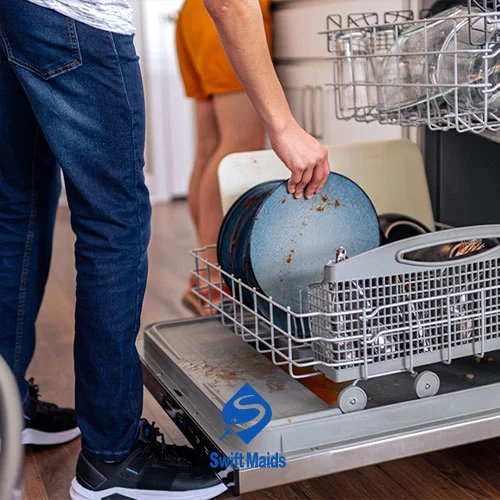Picture yourself standing triumphantly on top of Sulphur Mountain after a conquering hike, fridge stocked and ready for a celebratory meal. You excitedly open the dishwasher after the cycle, expecting spotless dishes, only to find a filmy mess, lingering food bits, or even a funky smell. Dishwashers are our kitchen warriors, silently battling dirty dishes day in and day out. But just like any hardworking teammate, they need some love and care too, to keep cleaning efficiently and hygienically.
There is nothing to worry about because, this guide is filled with easy cleaning dishwasher tips to get rid of all the grimes and bring your dishwasher back to its top performance. We’ll tackle common cleaning challenges, explore some nifty tricks, and leave your dishes sparkling clean without too much effort.
Cleaning Dishwasher Tips | Why Clean Your Dishwasher?
You might be thinking, “Doesn’t the dishwasher clean itself with every cycle?” Well, while soap and hot water do a great job on your dishes, they don’t address the build-up that can happen inside the dishwasher itself. Over time, nasty stuff like mineral deposits, grease, and food particles can build up in the filter, spray arms, and other hidden corners. This can lead to a few problems:
Not-so-clean dishes
A clogged filter or blocked spray arms means water and soap aren’t reaching all the nooks and crannies of your dishes, leaving them less than sparkling.
Stinky smells
Food bits stuck inside the dishwasher can start to decompose, creating unpleasant odors that can even spread throughout your kitchen.
Energy guzzling
A dirty dishwasher has to work harder to get the same cleaning job done, which can mean higher electricity bills.
Shorter lifespan
Neglecting regular cleaning can lead to wear and tear on your dishwasher’s parts, potentially leading to expensive repairs or even needing to replace the whole thing.
Convinced that regular cleaning is important? Great! Let’s dive into how to do it.
The Weekly Wipe Down
Here’s a quick and easy cleaning routine you can add to your weekly kitchen cleaning:
- Empty the dishwasher completely: Take out any leftover food scraps and remove the silverware basket and any racks that come out.
- Wipe down the door seal: Food bits and grime can get stuck in the rubber seal around the dishwasher door. Just wipe it down with a damp cloth to prevent mold or mildew from growing.
- Clean the stainless steel exterior: For a sparkling stainless steel dishwasher, use a stainless steel cleaner or a simple mix of vinegar and water. Wipe it with a microfiber cloth to get a shine without streaks.
The Monthly Deep Clean
Once a month, dedicate some extra time for a more thorough cleaning. Here’s what you’ll need in deep cleaning checklist:
- White vinegar
- Baking soda
- Dish soap
- Toothbrush (optional)
- Dishwasher cleaner (optional)
Here’s the process:
Clean the filter
another cleaning dishwasher tips include clean the filter. Check your dishwasher’s manual to find the filter, which is usually at the bottom of the dishwasher tub. Most filters can be easily removed by hand. Rinse the filter under running water to get rid of any trapped food particles. If the filter is super clogged, you might need to soak it in a vinegar solution for about 30 minutes before rinsing.
Unclog the spray arms
Hard water minerals can clog the tiny holes in the spray arms, stopping water from flowing properly. Check for any blockages and use a toothpick or a thin wire to carefully clear them out. If the spray arms are visibly dirty, you can take them out (check your manual for instructions) and soak them in a vinegar solution for about 30 minutes.
Run a hot water cycle with vinegar
Pour about two cups of white vinegar into a dishwasher-safe bowl and place it on the top rack. Run a hot water cycle to let the vinegar loosen up any built-up grease, hard water stains, and food particles.
Baking soda for fresh smells
After the vinegar cycle, sprinkle a cup of baking soda on the bottom of the dishwasher and run a short hot water rinse cycle without soap. This will help get rid of any lingering odors.
Bonus Dishwasher Cleaning Tricks
Don’t pre-rinse too much
Modern dishwashers are designed to handle some food scraps. Rinsing too much can actually waste water. Just scrape off any big food chunks before loading the dishwasher.
Load the dishwasher strategically
one important cleaning dishwasher tips is strategically load the dish washer. Make sure dishes aren’t blocking the spray arms from spinning freely. Check your dishwasher manual for the recommended loading pattern for the best cleaning.
Run a cleaning cycle with a commercial dishwasher cleaner
Some dishwasher makers recommend using a commercial dishwasher cleaner every few months. These cleaners can be especially helpful for tackling stubborn grime and mineral build-up. But before you rush out and buy one, check your dishwasher manual. Some manufacturers advise against using commercial cleaners, so it’s always best to be safe than sorry.
Keeping Your Dishwasher Fresh Between Cleanings
Here are a few simple habits to keep your dishwasher smelling good and working its best in between your cleaning routines:
- Wipe up spills before loading: Don’t let big spills or puddles of food sit in the dishwasher. Wipe them up with a paper towel before loading the dishes.
- Quick rinse cycle after heavy meals: For particularly greasy or messy dishes, consider running a short rinse cycle before your regular wash cycle. This will help remove some of the heavy grease and food particles before they have a chance to harden and clog the filter or spray arms.
- Leave the dishwasher door slightly open after a cycle: This allows moisture to evaporate and prevents mold or mildew growth.
Addressing Common Dishwasher Problems
Even with regular cleaning, you might sometimes encounter dishwasher issues. Here are a few quick cleaning dishwasher tips:
Dishes not drying properly
Check if the rinse aid dispenser is filled and make sure you’re using the right amount of rinse aid. Also, see if the dishes are crammed together, which can prevent proper airflow during the drying cycle.
Noisy dishwasher
Unusual noises could indicate a loose component or a problem with the spray arms. Consult your dishwasher manual or call a qualified appliance repair person to diagnose the problem.
Dishwasher leaking
A leak could be caused by a damaged door seal, a loose hose connection, or a faulty drain pump. Turn off the water supply to your dishwasher and call a technician to avoid further damage.
Conclusion
By following these easy cleaning dishwasher tips, you can keep your dishwasher working efficiently and hygienically for years to come. Remember, a clean dishwasher means not only sparkling clean dishes but also saving money on electricity bills and helping prevent costly repairs down the line. So, the next time you empty the dishwasher, take a few extra minutes to give it some love. Your dishes and your wallet will thank you for it!
And if you’re ever feeling overwhelmed by the mountain of kitchen cleaning, remember there are house cleaning services available in most areas. Don’t be afraid to delegate some tasks and free up your time for the things you enjoy. Now go forth and conquer those dirty dishes!




